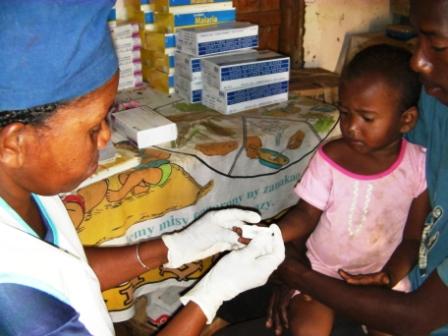Kazy Zafisoa is a community health worker in the fokontany of Enakasa, in the rural commune of Ranomafana, on the most southern tip of the East Coast of Madagascar.

Community health volunteer Kazy Zafisoa receiving ill children at the community hut built by the community in Enakasa Village. Source: Santénet2/Asos Sud
Kazy Zafisoa is a community health worker in the fokontanyii of Enakasa, in the rural commune of Ranomafana, on the most southern tip of the East Coast of Madagascar. The nearest public health center is more than an hour away. Ms. Zafisoa is highly motivated in her work, spending most of the day serving her community. She always makes herself available to see children under-five years of age, treating those who are sick with fever, acute respiratory infections, and diarrhea. Between April and June 2012, she managed 92 cases of malaria, 9 cases of diarrhea, and 18 cases of pneumonia in children under-five. She also assessed children’s nutritional status and identified 78 cases of malnutrition.
Because she is so effective and accessible, Ms. Zafisoa has become trusted and valued by the community. To demonstrate their appreciation, the people in her fokontany have begun to compensate her for her work, paying her approximately US$20 per month (the monthly salary of nurse at a health center is about US$100). Each household contributes 200 Ariary per month, (the equivalent of 10 US cents), collected by the head of fokontany. Furthermore, the community has built a health hut, a designated space in which Ms. Zafisoa now works. Mosa Manara, the head of the fokontany, is proud to have Ms. Zafisoa in his village, explaining: “We are convinced of Kazy Zafisoa’s worth for her promotion of child health in our village.”Kazy Zafisoa is happy with this community recognition. With her monthly income, she meets her family’s needs and she also builds up a buffer stock of commodities to take care of sick children. “I feel encouraged with what the community is doing for me,” she explains. “This does not mean I will stop if they are no longer able to pay me: I just love what I am doing.”
iWorld Bank, 2010
iiFokontany: the smallest administrative unit in Madagascar
